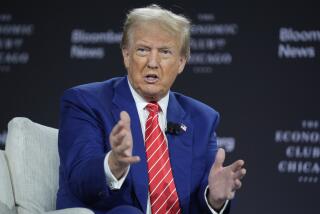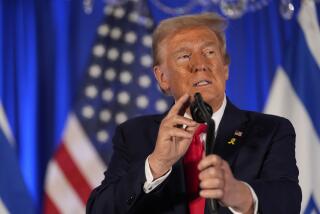U.S. and Russia remain far apart on Syria after Tillerson meets with Putin and other officials

Washington and Moscow tried to slow a free fall in relations. (April 13, 2017) (Sign up for our free video newsletter here http://bit.ly/2n6VKPR)
Reporting from Moscow — President Trump and Russian President Vladimir Putin tried to tap the brakes Wednesday on what appeared a free fall in relations between Washington and Moscow, but daylong talks between their top diplomats failed to bridge disputes over last week’s poison gas attack in Syria and other key issues.
Although the Kremlin earlier this week said Putin would not greet U.S. Secretary of State Rex Tillerson on his first official trip to Moscow, the Russian leader met the U.S. envoy for more than two hours in what appeared a determined effort to repair the growing breach.
Little concrete appeared to emerge from the meeting, although Foreign Minister Sergei Lavrov said later that “we understand each other better” and he saw “many prospects for cooperation,” including a possible resumption of arms control talks.
Lavrov said Moscow would put “back in force” a telephone hotline used to keep U.S. and Russian warplanes from colliding or accidentally firing at one another in the crowded skies over Syria. Russian officials said last week they would suspend the hotline.
The high-level meetings in Moscow came as Trump continued a week of flip-flops in which he has jettisoned large chunks of the foreign policy — and significant pieces of economic policy — that he espoused as he ran for the presidency.
Trump, who repeatedly praised Putin during last year’s campaign, told a White House news conference it would be “a fantastic thing if we got along with Putin and if we got along with Russia.”
“Right now we’re not getting along with Russia at all,” Trump added. “We may be at an all-time low in terms of relationship with Russia. This has built for a long period of time. But we’re going to see what happens.”
Putin also warned of worsening ties in a TV interview in Moscow.
“You can say that the level of trust on a working level, especially on the military side, has not improved but most likely worsened” since last week’s U.S. airstrike in Syria, Putin said, according to a transcript released by the Kremlin.
In a day of fast-moving diplomacy, Russia vetoed a U.S.-backed motion at the United Nations Security Council that would have required Syrian President Bashar Assad’s government to cooperate with U.N. investigators looking into the April 4 nerve gas attack on Khan Sheikhoun, a rebel-held village in Syria.
Visible shifts in Trump’s foreign policy began last Thursday with his decision to launch 59 cruise missiles at a Syrian military airfield, an airstrike that countered Trump’s position that the U.S. should not intervene overseas except to directly defend its own interests.
Trump’s explanation for why he ordered the strike — the painful images of children killed by a nerve gas attack that the U.S. blamed on Syrian government forces — had more in common with liberal internationalism than with his “America first” slogans.
At the same news conference, Trump declared that NATO, which he had repeatedly disparaged before he took office, was “no longer obsolete.” For 70 years, “the NATO alliance has been the bulwark of international peace and security,” he said.
He praised China, which he had consistently criticized during his campaign. And in an interview with the Wall Street Journal, he confirmed that his administration would not label China a “currency manipulator” — something he had pledged to do “on Day One.”
On the domestic policy side, he said in the interview that he would support continued operation of the Export-Import Bank, which he had opposed, and would consider reappointing Janet L. Yellen as chairwoman of the Federal Reserve when her term expires next year.
In Moscow, testy public statements confirmed that U.S.-Russian relations remain at a discordant level. In their news conference, Tillerson and Lavrov spoke in unusually blunt terms and publicly sparred over Syria and Ukraine.
They shook hands for the cameras as they met but did not smile and appeared unhappy with one another.
“There is a low level of trust” between Washington and Moscow, Tillerson warned. “The world’s two foremost nuclear powers cannot have this kind of relationship.”
“We need to attempt to put an end to this steady degradation, which is doing nothing to restore the trust between our two countries or to make progress on the issues of greatest importance to both of us,” he added.
But both diplomats said they saw ways to stop the slide.
Lavrov said the two governments had agreed to appoint special envoys to conduct what he called “a pragmatic conversation about the irritants, so to speak, that have piled up in our relationship under the Obama administration.”
The Obama administration imposed economic sanctions on Moscow in 2014 after it annexed the Crimean peninsula and intervened militarily in eastern Ukraine. Obama approved additional sanctions in December after U.S. intelligence agencies concluded that Russia had used hacking and other tactics to interfere in the 2016 presidential race.
“I for one would like to say that I do not think that Russia and the U.S. have so great a distance that it cannot be bridged on many issues of the international agenda, both with Syria and Ukraine,” Lavrov said. “It’s not impossible.”
Tillerson said they did not discuss easing sanctions, noting that anger in Congress over Russian meddling in last year’s election “is serious enough to attract additional sanctions.”
Lavrov quickly responded, saying the U.S. envoy “did not threaten me with sanctions; didn’t threaten me with anything, actually.”
They argued over U.S. charges that Assad’s forces carried out the chemical weapons attack last week that killed more than 80 people and injured hundreds more. Russian military forces support Assad in the multi-sided Syrian civil war, and Lavrov insisted he had seen “no confirmation” that Syrian forces had used nerve gas.
Lavrov instead took Tillerson to task for what he called the “illegitimate” U.S. cruise missile attack that followed, and the U.S. opposition to Assad’s continued rule.
He said the U.S. has a long history of toppling dictators, including Serbia’s Slobodan Milosevic, Iraq’s Saddam Hussein, Libya’s Moammar Kadafi and others in wars that he called a “blatant violation of international law.”
Earlier, as he stepped into a long session with Lavrov, Tillerson said he hoped to find “areas of common interest — even where our tactical approaches may be different — and further clarify areas of sharp difference.”
Lavrov said Moscow wanted to understand the Trump’s administration’s “real intentions.”
It is customary for new U.S. secretaries of State to meet with Russian presidents on their first trips to Moscow, a tradition that goes back to before World War II.
So the Kremlin statement on Monday that Putin would not receive Tillerson had seemed another sign of the nosedive in relations — especially since Putin had personally bestowed one of Russia’s highest honors, the Order of Friendship, on Tillerson just four years ago, when he was chief executive of Exxon Mobil.
Putin, in the TV interview, lashed out at U.S. allies in NATO for their unanimous support for the U.S. retaliatory strike in Syria.
“Everyone is nodding, like bobbing-head dolls, without analyzing anything that is happening,” Putin said. “Where is the proof the Syrian military used chemical weapons? None. And there is a violation of international law. That’s an obvious fact.”
Trump had studiously avoided criticizing Putin, but finally addressed the matter in an interview with Fox Business Network.
“Frankly, Putin is backing a person that’s truly an evil person,” Trump said, referring to Assad. “I think it’s very bad for Russia. I think it’s very bad for mankind.”
Times staff writers Wilkinson and Lauter reported from Washington. Special correspondent Mirovalev reported from Moscow.
For more on international affairs, follow @TracyKWilkinson on Twitter
ALSO
Putin: ‘Read my lips,’ there was no Russian meddling in U.S. vote
Trump to China: Help us rein in North Korea and we’ll back off on trade issues
Paul Manafort had an ambitious plan to benefit the Putin government, report says
More to Read
Sign up for Essential California
The most important California stories and recommendations in your inbox every morning.
You may occasionally receive promotional content from the Los Angeles Times.












